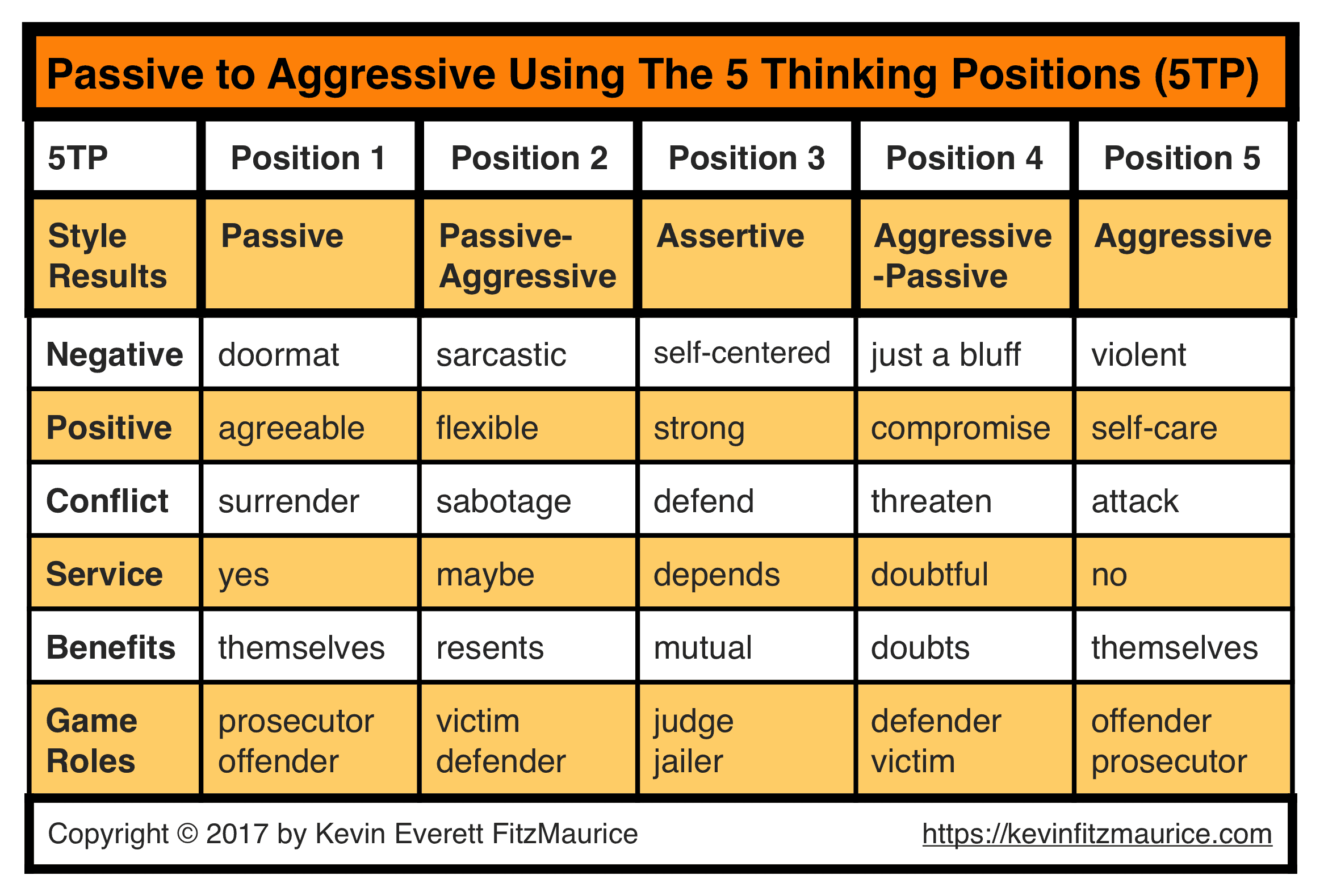3 Types of Clients: Neurotic, Psychotic, & Personality Disordered
- Garden will teach you an easy and effective Cognitive Behavioral Therapy (CBT & REBT) system.
- Felling-Intention Therapy incorporates and moves beyond CBT for faster and deeper results.
3 types of clients who come for counseling and their main issues. Check the 4 general rules for all 3 types of clients!
- Read for diagrams and maps of how people play games to manipulate and control.
3 Types of Clients: 4 General Rules
1. Assess intention & motivation.
- If deficient, first work on intention (reason) and motivation (drive) to change.
- Intention is their “why” for going through the effort of counseling.
- Motivation is their “how” for dealing with the effort of counseling.
- People need both to succeed.
- People need both to stay the course.
2. Assess payoffs & rewards for problems.
(destructive habits, self-defeating choices)
- If they are stuck, help remove current payoffs and establish new ones for better habits (new skills and choices).
- People have reasons to stay stuck that need to be eliminated.
- People often prefer problems to solutions because of psychological (ego) rewards.
- Please see Ego Payoffs for more information.
3. Asses the kind of reasoning they respond to.
- Three basic types are logical (makes sense), factual (scientific), and practical (functional).
- Most respond well to practical (how well it works) but do not assume.
- At certain stages, one kind of reasoning will work better than another.
4. Assess their coping & problem-solving skills.
- How are their coping and problem-solving skills in need of boosting?
- What coping skills will they need to complete counseling?
- What problem-solving skills will they need to complete counseling?
- What coping and problem-solving skills are they willing to learn?
- Read and master the life skill of acceptance using the best combination of CBT, REBT, & Stoicism.
- 3 types of clients can all be helped by teaching the STIFFER system.
3 Types of Clients: Neurotic Type
- Overthinking
- Over worrying
- Overanalyzing
- Trying a lot of the time
- Other-focused or self-absorbed
- Self-defeating
- Self-deprecating
- Lost in negative ego-story
- Bad acting because they are watching themselves act
Understand & Help
- The neurotic client is best described as a client who does not practice basic coping skills even if they know and agree with them.
- Look for the ego payoffs for the clients maintaining their problems, such as feeling superior to those they blame for their problems.
- Help them recognize, remove, and replace their ego payoffs and apply new and old coping skills to everyday situations.
- Read and master the life skill of acceptance using the best combination of CBT, REBT, & Stoicism.
- 3 types of clients can all be helped by teaching the STIFFER system.
3 Types of Clients: Psychotic Type
- Out of touch with reality
- Distorted to the extreme
- Lost in the internal world
- Fragmented ego-self into several roles
- Outside forces invade the inner world
- Lives in their own inner world, not shared
- Magical explanations & theories
- Self-destruction
- Delusions as reality
- Impractical & impossible ego-stories
Understand & Help
- The psychotic client is best described as a client who does not reality-check.
- Psychotic clients check their thinking against their thinking, not against their experience.
- Help them learn to test their thinking using experience by reminding them of when they already do this, for example, when looking for misplaced car keys.
- This practice will take time and patience but can show remarkable results.
- Read and master the life skill of acceptance using the best combination of CBT, REBT, & Stoicism.
- 3 types of clients can all be helped by teaching the STIFFER system.
3 Types of Clients: Personality Disordered
- Lying
- Faking
- Phony
- Using others
- Pretending
- Manipulating
- Deceiving
- Self in conflict with society & life
- Odd ways of relating
- Odd ways of making sense
- Odd beliefs & attitudes
- Proud of being strange
- Self-sabotaging
- Bizarre self-narratives & ego-stories
Understand & Help
- The personality-disordered client is best described as a client whose sense of self and personality are in conflict and struggle with society.
- The personality-disordered client can be helped by encouraging them to define and find themselves about other than society, such as God, philosophy, virtue, reason, or some overarching value they strongly agree with.
- Without their self being challenged by society (in their mind and emotions), this client will adjust to society more effectively and naturally.
- Read and master the life skill of acceptance using the best combination of CBT, REBT, & Stoicism.
- 3 types of clients can all be helped by teaching the STIFFER system.
3 Types of Clients: 5 Basic Client Positions
- Click on the table to go to a page explaining it.
- Read and discover the best diagrams and maps of how people play games with your mind and heart.
3 Types of Clients: Quotations Various Sources
Listed Alphabetically
“A fool is only a fool because he won’t see he is a fool.” —Kevin Everett FitzMaurice
“A fool remains a fool because he won’t see he is a fool.” —Kevin Everett FitzMaurice
“A man of genius makes no mistakes. His errors are volitional and are the portals of discovery.” —James Joyce
“But if ye be without chastisement, whereof all are partakers, then are ye bastards, and not sons.” —Hebrews 12:8
“By honestly acknowledging your past errors, but never damning yourself for them, you can learn to use your past for your own future benefit.” —Albert Ellis and Robert A. Harper, A Guide to Rational Living, Third Edition, p. 194
“Correction is grievous unto him that forsaketh the way: and he that hateth reproof shall die.” —Proverbs 15:5
“Failure doesn’t have anything to do with your intrinsic value as a person.” —Albert Ellis and Robert A. Harper, A Guide to Rational Living, Third Edition, p. 206
“For whom the Lord loveth he chasteneth, and scourgeth every son whom he receiveth.” —Hebrews 12:6
“If we eliminated all errors, we would also eliminate much discovery, art, insight, learning, and creativity that results from facing errors.” —Kevin Everett FitzMaurice
“If ye endure chastening, God dealeth with you as with sons; for what son is he whom the father chasteneth not?” —Hebrews 12:7
“My son, despise not the chastening of the LORD; neither be weary of his correction:” —Proverbs 3:11
“The greatest explorer on this earth never takes voyages as long as those of the man who descends to the depth of his heart.” —Julien Green
“The trouble with most of us is that we would rather be ruined by praise than saved by criticism.” —Norman Vincent Peale
“When receiving correction, the wise seeks to learn, and the fool seeks to justify with excuses.” —Kevin Everett FitzMaurice
3 Types of Clients: Scripture Quotations on Counseling
Listed Biblically
“A wise man will hear, and will increase learning; and a man of understanding shall attain unto wise counsels:” —Proverbs 1:5
“Where no counsel is, the people fall: but in the multitude of counselors there is safety.” —Proverbs 11:14
“The way of a fool is right in his own eyes: but he that hearkeneth unto counsel is wise.” —Proverbs 12:15
“Deceit is in the heart of them that imagine evil: but to the counselors of peace is joy.” —Proverbs 12:20
“Without counsel purposes are disappointed: but in the multitude of counselors they are established.” —Proverbs 15:22
“Hear counsel, and receive instruction, that thou mayest be wise in thy latter end.” —Proverbs 19:20
“Every purpose is established by counsel: and with good advice make war.” —Proverbs 20:18
“Take counsel, execute judgment; make thy shadow as the night in the midst of the noonday; hide the outcasts; bewray not him that wandereth.” —Isaiah 16:3
“Extol not thyself in the counsel of thine own heart; that thy soul be not torn in pieces as a bull [straying alone.]” —Ecclesiasticus 6:2
“As timber girt and bound together in a building cannot be loosed with shaking: so the heart that is stablished by advised counsel shall fear at no time.” —Ecclesiasticus 22:16
“Give not over thy mind to heaviness, and afflict not thyself in thine own counsel.” —Ecclesiasticus 30:21
“A man of counsel will be considerate; but a strange and proud man is not daunted with fear, even when of himself he hath done without counsel.” —Ecclesiasticus 32:18
“And let the counsel of thine own heart stand: for there is no man more faithful unto thee than it.” —Ecclesiasticus 37:13
“Let reason go before every enterprize, and counsel before every action.” —Ecclesiasticus 38:33
“Gold and silver make the foot stand sure: but counsel is esteemed above them both.” —Ecclesiasticus 40:25
- Read and master the life skill of acceptance using the best combination of CBT, REBT, & Stoicism.
- 3 types of clients can all be helped by teaching the STIFFER system.
3 Types of Clients: Related Pages of Free Information
- CBT, CT, & REBT Cognitive Psychotherapies: List Pages
- Change & 15 Beliefs Regarding Change
- Change: Is it Possible?
- Chemical Imbalance Theory Debunked: External
- Coping Skills: Free Help
- Counseling Issues: Free Help
- Ego & Self-Esteem Fast-Facts
- Emotional Responsibility: List Pages
- Exercises & Techniques: List Pages
- Feeling & Coping: Fast-Facts
- Freud’s Ego Defense Mechanisms
- REBT (Rational Emotive Behavior Therapy): List Pages
- Self-Esteem Issues: List Pages
- Unconditional Self-Esteem (USE): Defined
- Read and discover the best diagrams and maps of how people play games with your mind and heart.
- Read and master the life skill of acceptance using the best combination of CBT, REBT, & Stoicism.
- 3 types of clients can all be helped by teaching the STIFFER system.
3 Types of Clients: 6 Groups of Topics Menu
- 1. Pages by Topic
- 2. Fast-Facts by Topic
- 3. Quotations by Topic
- 4. Poems by Topic
- 5. Scripture by Topic
- 6. Websites by Topic
- Read and master the life skill of acceptance using the best combination of CBT, REBT, & Stoicism.
- 3 types of clients can all be helped by teaching the STIFFER system.
3 Types of Clients: 9 Skills & Topics Menu
- 1. Anger Skills & Topics
- 2. Blame Skills & Topics
- 3. Communication Skills & Topics
- 4. Coping Skills & Topics
- 5. Counseling Skills & Topics
- 6. Praying Skills & Topics
- 7. Recovery Skills & Topics
- 8. Responsibility Skills & Topics
- 9. Thinking Skills & Topics
- Read and master the life skill of acceptance using the best combination of CBT, REBT, & Stoicism.
- 3 types of clients can all be helped by teaching the STIFFER system.



